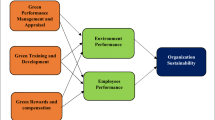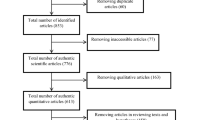Abstract
This research focuses on institutional trust based on the general trust discourse using a theoretical framework to delve into institutional trust based on various organisational performance measures and citizen perception indicators. It employs a social survey method to empirically inquire into citizen perceptions and the level of their satisfaction from service delivery and the extent of their trust in locally-based institutions providing public services in an urban setting. The findings indicate that trust is dependent on the performance of service staff, the values they manifest, the process involved in obtaining services, and the sorts of measures used to assess performance.

Similar content being viewed by others
References
Ahmed, W. (2018). BRTA makes it to the top of bribery chart. The Financial Express. Retrieved from https://thefinancialexpress.com.bd/css/favicon/apple-icon-57x57.png. Accessed 22 Mar 2021.
Alam, Q., & Teicher, J. (2012). The state of governance in Bangladesh: The capture of state institutions. South Asia: Journal of South Asia Studies, 35(4), 858–884. https://doi.org/10.1080/00856401.2012.702723
Algan, Y. (2018). Trust and social capital. In J.E. Stiglitz, J. Fitoussi & M. Durrand (eds.), For Good Measure: Advancing Research on Well-Being Metrics Beyond GDP (pp. 283–320). Paris: OECD. https://doi.org/10.1787/9789264307278-en
Almond, G.A. & Verba, S. (1963). The Civic Culture: Political Attitudes and Democracy in Five Nations. Princeton University Press.
Askvik, S., & Jamil, I. (2013). The institutional trust paradox in Bangladesh. Public Organization Review, 13(4), 459–476.
Baniamin, H. M. (2021). Linking trust, performance, and governance quality: What can explain the incongruity? Commonwealth & Comparative Politics, 59(2), 128–148.
Baniamin, H. M., Jamil, I., & Askvik, S. (2020). Mismatch between lower performance and higher trust in the civil service: Can culture provide an explanation? International Political Science Review, 41(2), 192–206.
Basu, I., Devine, J., & Wood, G. (eds.) Politics and Governance in Bangladesh Uncertain Landscapes (pp. 168–177). London: Routledge.
Blind, P. K. (2006). Building Trust in Government in the Twenty-First Century: Review Of Literature and Emerging Issues. 7th Global Forum on Reinventing Government Building Trust in Government 26–29 June 2007, Vienna, Austria. https://www.almendron.com/tribuna/wp-content/uploads/2016/11/building-trust-in-government-in-the-twenty-first-century.pdf (Accessed 2 January 2021)
Bouckaert, G., & Van de Walle, S. (2001). Government Performance and Trust in Government. Paper for the Permanent Study Group on Productivity and Quality in the Public Sector at the EGPA Annual Conference, Vaasa, Finland, 2001: Trust Building Networks - How the Government Meets Citizen in the Post-Bureaucratic Era: Citizen Directed Government. https://www.researchgate.net/publication/228767477_Government_Performance_and_Trust_in_Government. Accessed 22 March 2021
Brewer, G. A. (2003). Building Social Capital: Civic Attitudes and Behavior of Public Servants. Journal of Public Administration Research and Theory, 13(1), 5–26.
Carino, L. V. (2008). Building Trust on Government in Southeast Asia. https://www.eastwestcenter.org/sites/default/files/filemanager/Research_Program/Politics_Governance_and_Security/AGDI/Trust%20in%20Government%20in%20Southeast%20Asia.pdf.Accessed 19 may 2021.
Christensen, T., & Lægreid, P. (2005). Trust in Government: The Relative Importance of Service Satisfaction, Political Factors, and Demography. Public Performance & Management Review, 28(4), 487–511.
Delhey, J., & Newton, K. (2003). Who trusts? The origins of social trust in seven societies. European Societies, 5(2), 93–137.
Devine, J., Basu, I., & Wood, G. (2018). Governance challenges in Bangladesh: Old wine in not so new bottles? In I. Basu, J. Devine, & G. Wood (Eds.), Politics and Governance in Bangladesh Uncertain Landscapes (pp. 168–177). Routledge.
Easton, D. (1975). A re-Assessment of the concept of political support. British Journal of Political Science, 5(4), 435–457.
Fukuyama, F. (1995). Trust: The Social Virtues and the Creation of Prosperity. Free Press.
Golembiewski, R. T., & McConkie, M. L. (1975). The centrality of interpersonal trust in group processes. In C. L. Cooper (Ed.), Theories of Group Processes (pp. 131–185). John Wiley.
Grönroos, C. (2000). Service Management and Marketing: A Customer Relationship Management Approach. John Wiley and Sons.
Hirschman, A. O. (1992). Rival Views of Market Society and Other Recent Essays. Harvard University Press.
Hobbes, T. (1651). Leviathan. 2017 edition. London: Penguin
Hofstede, G., Hofstede, G. J., & Minkov, M. (2010). Cultures and Organizations: Software of the Mind (3rd ed.). McGraw-Hill.
The Independent. (2020). ‘BTCL gets into revival mode’, 5 February. http://www.theindependentbd.com/ (Accessed 22 February 2021).
Jahan, F. (2006). Public Administration in Bangladesh. Background Paper for the State of Governance in Bangladesh 2006. Centre for Governance Studies, BRAC University. http://hdl.handle.net/10361/343 (Accessed 22 April 2021)
Jamil, I. (2002). Administrative Culture in Bangladesh: Tensions between Tradition and Modernity. International Review of Sociology, 12(1), 93–125.
Jamil, I., & Askvik, S. (2015). Citizens’ trust in public and political institutions in Bangladesh and Nepal. In I. Jamil, S. M. Aminuzzaman, & S. T. M. Haque (Eds.), Governance in South, Southeast, and East Asia: Trends, Issues and Challenges (pp. 157–174). Springer.
Jamil, I., & Baniamin, H. M. (2021). How culture may nurture institutional trust: Insights from Bangladesh and Nepal. Development Policy Review, 39(3), 419–434.
Kim, S. E. (2005). The role of trust in the modern administrative state an integrative model. Administration and Society, 37(5), 611–635.
Kim, S. (2010). Public trust in government in Japan and South Korea: Does the rise of critical citizens matter. Public Administration Review, 70(5), 801–810.
Kumlin, S. (2002). Institutions—Experiences—Preferences: How Welfare State Design Affects Political Trust and Ideology. In B. Rothstein & S. Steinmo (Eds.), Restructuring the Welfare State: Political Institutions and Policy Change (pp. 20–50). Palgrave Macmillan.
Lewis, J. D., & Weigert, A. (1985). Trust as a social reality. Social Force, 63(4), 967–985.
Lewis, J. M. (2017). The politics and consequences of performance measurement. Policy and Society, 34(1), 1–12.
Li, P. P. (2012). When trust matters the most: The imperatives for contextualizing trust research. Journal of Trust Research, 2(2), 101–106.
Locke, J. (1689). Two Treatise on Government. 1993 edition. Manila: Phoenix.
Maloney, C. (1986). Behaviour and Poverty in Bangladesh. The University Press.
Marien, S., & Hooghe, M. (2011). Does Political Trust Matter? An Empirical Investigation into the Relation between Political Trust and Support for Law Compliance. European Journal of Political Research, 50(2), 267–291.
Mayer, R. C., Davis, J. H., & Schoorman, F. D. (1995). An integrative model of organizational trust. Academy of Management Review, 20, 709–734. https://doi.org/10.2307/258792
McAllister, D. J. (1995). Affect- and cognition-based trust as foundations for interpersonal cooperation in organizations. Academy of Management Journal, 38(1), 24–59.
Nyhan, R. C. (2000). Changing the paradigm: Trust and its role in public sector organizations. American Review of Public Administration, 30(1), 87–109.
OECD. (2017). Trust and Public Policy: How Better Governance Can Help Rebuild Public Trust. OECD Publishing, Paris. https://doi.org/10.1787/9789264268920-en(Accessed22April2021)
Oh, Y., & Bush, C. B. (2016). Assessing public sector performance and untangling the complexity of public performance measurement. International Review of Public Administration, 20(3), 256–272.
Oliver, R. L. (2010). Satisfaction: A Behavioral Perspective on the Consumer. Routledge.
Osborne, D., & Gaebler, T. (1992). Reinventing Government: How the Entrepreneurial Spirit is Transforming the Public Sector. Addison-Wesley.
Osman, F. A. (2016). Road to e-governance and public service delivery in Bangladesh: How long is the journey. In N. Ahmed (Ed.), Public Policy and Governance in Bangladesh: Forty Years of Experience (pp. 197–213). Routledge.
Parasuraman, A., Zeithaml, V. A., & Berry, L. L. (1985). A conceptual model of service quality and its implications for future research. Journal of Marketing, 49(4), 41–50.
Putnam, R. (1993). Making Democracy Work: Civic Traditions in Modern Italy. Princeton University Press.
Putnam, R. D. (2000). Bowling Alone: The Collapse and Revival of American Community. Simon & Schuster.
Raaphorst, N., & Van de Walle, S. (2018). Trust in and by the public sector. In R. Searle, A. Nienaber, & S. Sikin (Eds.), Routledge Companion to Trust (pp. 469–482). Routledge.
Rabbi, A. R. (2019). Several drivers using fake papers to ply Bangladesh’s roads. Dhaka Tribune. May 8. https://cdnjs.cloudflare.com/ajax/libs/bootswatch/4.0.0/cerulean/bootstrap.min.css (Accessed 8 March 2021).
Rahman, M. S. (2006). Lokprashashan Tatta O Bangladesh Prashashan [in Bengali]. Khan Brothers & Co.
Rothstein, B. & Stolle, D. (2007). The Quality of Government and Social Capital: A Theory of Political Institutions and Generalized Trust. QoG Working Paper Series, Sweden: The Quality of Government Institute, Department of Political Science, Goteborg University, Sweden, 2007. https://www.semanticscholar.org/paper/The-Quality-of-Government-and-Social-Capital%3A-A-of-Rothstein-Stolle/9729bc5920c816c87b2015280e7a8e676e730bd1. Accessed 7 March 2021
Rothstein, B., & Teorell, J. (2008). What is quality of government? A theory of impartial government institutions. Governance, 21(2), 165–190.
Rotter, J. B. (1967). A new scale for the measurement of interpersonal trust. Journal of Personality, 35(4), 651–665.
Rousseau, D. M., Sitkin, S., Burt, R. S., & Camerer, C. F. (1998). Not so different after all: A cross-discipline view of trust. Academy of Management Review, 23(3), 393–404.
Rousseau, J-J (1762). The Social Contract. C. Betts (trans.) 1994 edition. Oxford University Press
The Daily Star. (2010). BTCL plagued with bribery, influence, 24 March. https://www.thedailystar.net/news-detail-131339.Accessed 22 February 2021.
Tyler, T. R. (1998). Trust and democratic governance. In V. Braithwaiye & M. Levi (Eds.), Trust and Governance (pp. 269–294). Russell Sage Foundation.
Van de Walle, S., & Bouckaert, G. (2003). Public service performance and trust in government: The problem of causality. International Journal of Public Administration, 26(8 & 9), 891–913.
Van de Walle, S., & Migchelbrink, K. (2020). Institutional quality, corruption, and impartiality: The role of process and outcome for citizen trust in public administration in 173 European regions. Journal of Economic Policy Reform. https://doi.org/10.1080/17487870.2020.1719103
Van de Walle, S., Van Roosbroek, S., & Bouckaert, G. (2008). Trust in the public sector: Is there any evidence for a long-term decline? International Review of Administrative Sciences, 74(1), 47–64.
Van Ryzin, G. G. (2011). Outcomes, process, and trust of civil servants. Journal of Public Administration Research and Theory, 21(4), 745–760.
Van de Walle, S. (2013). The role of trust in public services and public sector reform. In C. Madureira & M. Asensio (eds.), Handbook de Administração Pública (pp 145–158). Oeiras: Instituto Nacional de Administração
Williams, D. W. (2004). Evolution of performance measurement until 1930. Administration and Society, 36(2), 131–165.
Wood, G. (2000). Prisoners and escapees: Improving the institutional responsibility square in Bangladesh. Public Administration & Development, 20(3), 221–237.
Wuthnow, R. (1998). The foundation of trust. Report from the Institute for Philosophy and Public Policy. http://www.puaf.umd.edu/ippp/summer98/foundations_of_trust.htm. Accessed 12 march 2021
Zafarullah, H. (2013). Bureaucratic culture and the social-political connection: The Bangladesh example. International Journal of Public Administration, 36(13), 932–939.
Zafarullah, H. (2015). The Governmental Machinery in Bangladesh. In N. Ahmed (Ed.), Forty Years of Public Administration and Governance in Bangladesh (pp. 91–108). University Press Ltd.
Zafarullah, H. (2016). Public Administration and Bureaucracy. In A. Riaz & S. Rahman (Eds.), Routledge Handbook of Contemporary Bangladesh (pp. 94–108). Routledge.
Zeithaml, V. A., Bitner, M. J., & Gremler, D. D. (2006). Services Marketing: Integrating Custome Focus Across the Firm (4th ed.). McGraw-Hill/Irwin.
Zhao, & Hu. (2017). Determinants of public trust in government: Empirical evidence from urban China. International Review of Administrative Sciences, 83(2), 358–377.
Author information
Authors and Affiliations
Corresponding author
Additional information
Publisher's Note
Springer Nature remains neutral with regard to jurisdictional claims in published maps and institutional affiliations.
Rights and permissions
About this article
Cite this article
Tanny, T.F., Zafarullah, H. Performance Values, Service Delivery and Citizen Satisfaction: A Study of Institutional Trust in Bangladesh. Public Organiz Rev 23, 225–244 (2023). https://doi.org/10.1007/s11115-021-00599-1
Accepted:
Published:
Issue Date:
DOI: https://doi.org/10.1007/s11115-021-00599-1




